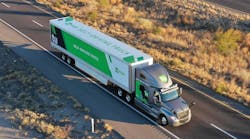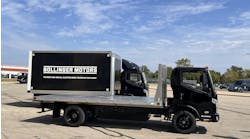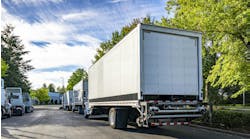Study: New research finds TuSimple trucks are at least 10% more fuel efficient than traditional trucks
TuSimple, a self-driving truck company, and University of California San Diego (UC San Diego) released research results that prove TuSimple’s autonomous technology significantly reduces fuel consumption of heavy-duty trucks by at least 10%. The findings are part of new fuel study from the UC San Diego’s Jacobs School of Engineering and TuSimple.
“We wanted to address how the introduction of autonomy impacts fuel consumption and the environment, and in every case, TuSimple’s autonomous mode performed better than the manual mode in terms of efficiency,” said Henrik Christensen, director of the Contextual Robotics Institute and computer science professor at UC San Diego, who led the study. “This is a major win not only for TuSimple, but for the trucking industry as it works to transition into a clean fleet era.”
For this study, TuSimple Level 4 autonomous trucks were fitted with a blackbox that extracted driving data over a period of six months, which included 122 autonomous missions totaling nearly 6,700 miles. Based on the available data, researchers used the Virginia Tech Comprehensive Power-based Fuel Consumption model to estimate fuel consumption as a function of speed, location, acceleration and breaking. Manually driven trucks were also fitted with the same black box technology, allowing researchers to compare how fuel consumption differs between autonomous and manual heavy-duty trucks.
Fuel consumption was then analyzed across different ranges of speed including 0-30 mph, 30-40 mph, 40-50 mph, 50-60 mph, 60+ mph. The study found that fuel consumption between autonomous and manual driven vehicles at lower speeds has the most significant fuel savings because of the complex driving that happens at a lower speed.
McLane, a supply chain services leader and a wholly owned unit of Berkshire Hathaway Inc., delivers more than 10 billion pounds of merchandise to customers every year. The company has partnered with TuSimple to execute four runs per day on two routes in Arizona, hauling food for their corporate restaurant customers.
“McLane chose to partner with TuSimple because they are a leader in autonomous technology,” said Daniel James, director of logistics and transportation management at McLane. “The relationship enables us to enhance the safety of our operations and drivers, improve our fuel efficiency and environmental impact and address the increasing driver shortage. McLane understands the impact that TuSimple’s technology can have on our industry and society as a whole, and we are excited to be at the forefront of this development.”
Heavy-duty vehicles account for 20% of transportation-sector greenhouse gas (GHG) emissions in the United States. If all medium-duty and heavy-duty trucks adopted TuSimple’s self-driving technology, it would result in an estimated savings of 42 million metric tons of CO2 emissions per year, based on calculations using the EPA’s Inventory of U.S. Greenhouse Gas Emissions and Sinks report that outlines transportation emissions. Applying TuSimple’s 10% to all U.S. diesel trucks would result in an estimated savings of 4 billion gallons of fuel totalling $10 billion per year, according to calculations based on ATA fuel consumption reports.
“The research findings from UC San Diego validate our belief that TuSimple trucks will significantly reduce the environmental impact of heavy-duty trucking,” said Arda Kurt, director of motion planning and control at TuSimple and former research assistant professor at The Ohio State University College of Engineering. "We plan to optimize our technology for fuel and emissions savings in the future, meaning these numbers will be even more significant as we further develop our technology.”
The trucking industry in the U.S., the E.U. and China combined consumes 17 million barrels of oil per day. This corresponds to about 1/5 of the global oil demand according to International Energy Agency. Consequently, environmental agencies are imposing extra taxes on heavy duty trucking.
TuSimple is aiming to transform the $800 billion U.S. trucking industry by increasing safety, lowering costs, reducing carbon emissions and providing tools to optimize fleet logistics for operators. The company has 18 contracted customers and makes between 13-19 autonomous trips per day every day in Arizona. The company plans to start driverless operations in 2021.



